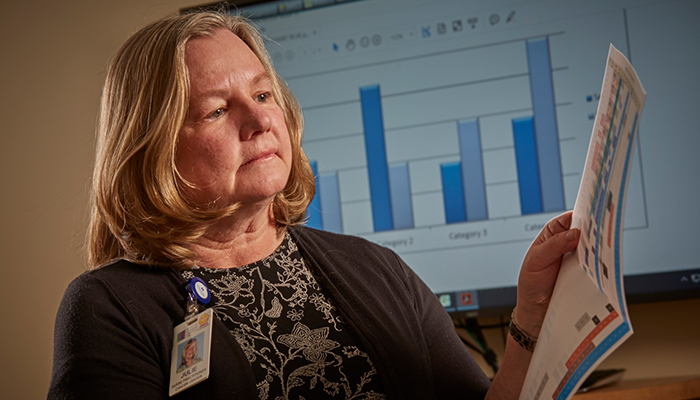New medications offer hope for patients with BRCA-related ovarian and metastatic breast cancer
Julie Thompson is excited to be on the cutting edge of medicine when it comes to cancer.
Thompson, a genetics nurse practitioner with Nassif Community Cancer Center, says her field is opening the door to new treatment options for some patients. “In the past, genetic testing for hereditary cancer syndrome was done not so much for the patient, but for family members so they would know if they were at increased risk. Now new studies are showing promise in treating some cancers that have a hereditary genetic mutation. By identifying these mutations, we can actually help steer treatment.”
Thompson cites a new class of drug recently approved by the FDA for use in some types of metastatic breast cancer (cancer that has spread to lymph nodes or other parts of the body) and all types of ovarian cancer.
“What’s exciting is this class of drug seems to work best for patients who have the hereditary BRCA genetic mutation,” says Thompson. “It’s an example of how genetic testing is helping determine treatment.”
The goal for these drugs, known as PARP inhibitors, is to slow the disease and help maintain a patient’s quality of life. “It’s not a cure,” Thompson explains. “But if we can give the patient a slower progression, and provide a better quality of life during that time, it’s a great thing. We want to use everything in our tool kit to help these patients live as normal of a life as possible.”
With the approval of PARP inhibitors, the Nassif Community Cancer Center Cancer Risk Assessment and Genetic Clinic recommends a hereditary genetic evaluation for patients with metastatic breast cancer, regardless of age or family history. Testing is also recommended for any woman with ovarian cancer. In most cases, testing is covered by insurance.
Genetic testing at Nassif Community Cancer Center includes taking a thorough family history and explaining the benefits and risks of testing. “I have to stress these medications are not beneficial for everyone,” says Thompson.
“It’s important to talk to your doctor to see if genetic testing is right for you.” Women who were diagnosed with early-stage ovarian cancer several years ago and are no longer under the care of an oncologist can self-refer for genetic testing.
Thompson adds, “I believe this is just the tip of the iceberg when it comes to understanding how our genes will help direct cancer treatment. Our understanding of genetics is expanding rapidly. It’s wonderful that we can use genetic testing to help not just family members but patients as well.”
To schedule an appointment to discuss your cancer risk with one of our genetic nurse practitioners, call (319) 558-4876.







